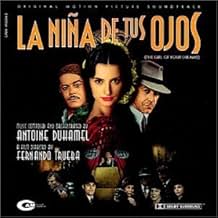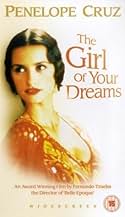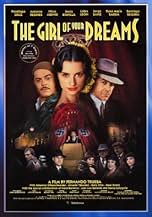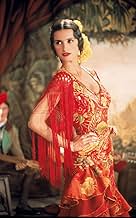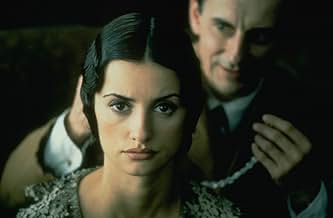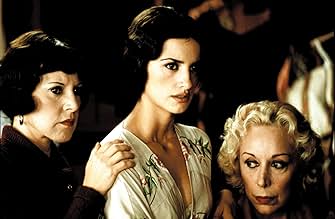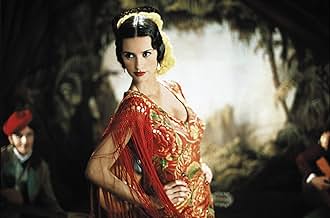IMDb RATING
6.7/10
4.7K
YOUR RATING
A company of Spanish movie makers leaves Franco's Spain and moves to Hitler's Germany to produce a film. Problems soon arise.A company of Spanish movie makers leaves Franco's Spain and moves to Hitler's Germany to produce a film. Problems soon arise.A company of Spanish movie makers leaves Franco's Spain and moves to Hitler's Germany to produce a film. Problems soon arise.
- Awards
- 14 wins & 16 nominations total
Rosa Maria Sardà
- Rosa Rosales
- (as Rosa María Sardá)
Miroslav Táborský
- Václav
- (as Mirosláv Táborský)
Juan Luis Galiardo
- Embajador
- (as Juan Luís Galiardo)
Jan Preucil
- Maisch
- (as Jan Přeučil)
Borivoj Navrátil
- Henkel
- (as Bořivoj Navrátil)
Featured reviews
Without trying to offend anybody I have to agree with another reviewer in that an explanation for the bad reception of this film among the non-Spanish speakers reviewers was exactly that: Spanish is not their first language and this is sometimes, as another reviewer has pointed out, a difficult film to understand if you are not a native speaker. A full understanding of the dialogue would help to clarify some of the bizarre scenes in the film. It might not be the best script written by Rafael Azcona, without any doubt one of the best scriptwriters in the history of Spanish cinema, but at times it is hilarious. A better grasp of Spanish history and culture would also come quite handy. So what else can you say about Penelope Cruz in the scene where she dances and sings for Goebbels?. As one her shoe is missing, she unintentionally imitates Goebbles, as she approaches him in a frontal shot, who is lame.
Jokes on the Spanish fascist are more than just clichés. For example the cuckold Spanish ambassador played by Juan Luis Galiardo and his nymphomaniac wife, played by Maria Barranco. And the wisecracking remark made by the pro-fascist Spanish troupe leading man, Jorge Sanz, wooded by his German counterpart "Yo doy todo por mi patria menos mi culo", he would give anything for his country except his ass. They are both an amusing pisstaking on fascist patriotic macho culture. This subject of patriotism being a hot issue right now in Spain where the right-wing government of Aznar is endorsing the notion of "Patriotismo Constitucional" or Constitutional Patriotism developed by the German philosopher Jürgen Habermas. Unashamedly, the film upholds the necessity to produce espanoladas. As the film director Blas Fontiveros, played by Antonio Resines, remarks that the life of a Spanish hero has more relevance to Spanish audiences, as they feel more identified, than for example Al Capone's. 5 Spanish (espanoladas) films were, in fact, made in Nazi Germany. Two starred by Imperio Argentina and another 2 by Estrellita Castro both stars of the "cine folclorico espanol".
As already remarked by some reviewers the film copies scenes from other films, the most obvious being its final sequence, which is a rip off of the end of Casablanca, but to suggest that it is a carbon copy of such and such a film is pure overstatement and a rather facile critique of the film. Yet its politics are not at all convincing, not to say rather naïve. The introduction of the Russian Jewish character signals the fall of the film into sentimental humanism and vacuous romantic trifle from where the film does not recover. Nevertheless La Nina de tus Ojos has its charms too and I found it extremely funny. The cast is excellent (Penelope Cruz playing an andalusian, a role she had already done in Almodovar's "Todo Sobre mi Madre" as a prostitute). Resines and Sanz are a surprise as well as Santiago Segura. But special mention deserves Miroslav Táborský, playing Vaclav the interpreter. Subtle looks at Macarena tell of his unrequited love for her. His increasing fascination with Macarena moves him away from his non-interventionist stand to resignedly accept his fate by the end of the film, along with Fontiveros who is Macarena's lover, at the hands of the Nazi. Yet this is never overdone as the change of views underwent by the other characters towards the Nazi regime, in particular the case of Julian Torralba. This little subplot of the film is quite moving rather sentimental and its quiet essence contrast sharply with the bombardment of dialogue coming from the rest of the cast.
Jokes on the Spanish fascist are more than just clichés. For example the cuckold Spanish ambassador played by Juan Luis Galiardo and his nymphomaniac wife, played by Maria Barranco. And the wisecracking remark made by the pro-fascist Spanish troupe leading man, Jorge Sanz, wooded by his German counterpart "Yo doy todo por mi patria menos mi culo", he would give anything for his country except his ass. They are both an amusing pisstaking on fascist patriotic macho culture. This subject of patriotism being a hot issue right now in Spain where the right-wing government of Aznar is endorsing the notion of "Patriotismo Constitucional" or Constitutional Patriotism developed by the German philosopher Jürgen Habermas. Unashamedly, the film upholds the necessity to produce espanoladas. As the film director Blas Fontiveros, played by Antonio Resines, remarks that the life of a Spanish hero has more relevance to Spanish audiences, as they feel more identified, than for example Al Capone's. 5 Spanish (espanoladas) films were, in fact, made in Nazi Germany. Two starred by Imperio Argentina and another 2 by Estrellita Castro both stars of the "cine folclorico espanol".
As already remarked by some reviewers the film copies scenes from other films, the most obvious being its final sequence, which is a rip off of the end of Casablanca, but to suggest that it is a carbon copy of such and such a film is pure overstatement and a rather facile critique of the film. Yet its politics are not at all convincing, not to say rather naïve. The introduction of the Russian Jewish character signals the fall of the film into sentimental humanism and vacuous romantic trifle from where the film does not recover. Nevertheless La Nina de tus Ojos has its charms too and I found it extremely funny. The cast is excellent (Penelope Cruz playing an andalusian, a role she had already done in Almodovar's "Todo Sobre mi Madre" as a prostitute). Resines and Sanz are a surprise as well as Santiago Segura. But special mention deserves Miroslav Táborský, playing Vaclav the interpreter. Subtle looks at Macarena tell of his unrequited love for her. His increasing fascination with Macarena moves him away from his non-interventionist stand to resignedly accept his fate by the end of the film, along with Fontiveros who is Macarena's lover, at the hands of the Nazi. Yet this is never overdone as the change of views underwent by the other characters towards the Nazi regime, in particular the case of Julian Torralba. This little subplot of the film is quite moving rather sentimental and its quiet essence contrast sharply with the bombardment of dialogue coming from the rest of the cast.
Penelope Cruz is so good in this movie she carries it; you really want to see what happens next. She has some great musical numbers and some excellent dramatic scenes. I also found the set design and scenery superior, as well as just the visuals who contrast the small, swarthy Spaniards against the Aryan ideal. The DVD I rented had two versions, in Castillian Spanish and Mexican Spanish, with English sub-titles, which was interesting when the characters spoke in German, as that was not translated unless a translator actually did it in the film. Actually there was even a little Russian. The supporting cast gets a little slapstick at times, but I found the film well worth it as a Cruz vehicle--she is quite a beautiful actress. 8/10.
Reviewing the comments, you can spot a trend: people from Spanish speaking countries like the movie while the rest, don't. The reason is that its not possible to translate the movie without loosing a lot in the process: the dialogues and expressions are what really makes the film funny. Personally, I think the movie is fantastic.
One may wonder if "La niña de tus ojos" really deserves all the nominations and awards it got. It is not "Belle époque" and there are some obvious clichés but it's still a very enjoyable film. The colours are vibrant and the black humour is piquant though not everyone (especially the English-speaking audience, and Asian audiences not exposed to this sort of humour) may appreciate it. Of course, the fabulous Penelope Cruz will make one overlook whatever faults there are in the film. As usual, she's brilliant. The interplay of dialogue in Spanish, German and Russian is hilarious. Liked it very much.
OK, I've never been a great fan of Penelope Cruz, but I was going to take my Spanish exams two weeks before I watched this film and I thought it would be good practice. I was pleasantly surprised! The movie takes place in 1938 and shows the story of a Spanish film crew, one that is funded by Franco, which is invited by Goebels to Germany to make a Spanish and a German version of the film "La Nina De Tus Ojos" (freely translated into something like "The Girl Of Your Dreams"). And when they arrive at the studios of UFA, the mayhem begins! First of all, I would like to note that this is a great production. It's obvious that plenty of money were thrown into it, a thing that is obvious in some scenes. There are some scenes that are very funny and some characters in general make you laugh from the moment they appear on screen. Personally I will never forget that dog in the beginning! You will know when you'll see it.
Trueba's directing is very good. Although I had heard his name before, I hadn't had the chance to watch some other movie of his before this one. I will try to in the future. He managed to keep the whole thing running, never making the viewer get bored at a single moment. And well, at those moments when the plot had started getting a bit slow, he threw in Penelope Cruz's breasts! What I didn't like was the political statements this movie tried to make. They seemed completely out of place and most of them were childish. First of all, all those arguments about the Jews that Cruz's character made hardly had anything to do with what was going on at the moment and they seemed as if they were forced. In fact, I can't understand why the Jewish character was there. He is the only one among the gypsies that were brought to the studio, or at least they don't show us any more. But the Germans didn't place Jews and gypsies in the same concentration camps! Anyway... Some times it just felt as if the producers hoped that they could sell this film to Hollywood (I hope you understand the connection). And of course the way they portrayed Goebels was way too cartoonish. Of course I know this is a comedy and Goebels had indeed some very ridiculous things going on about him and, yes, he did sleep with many actresses but well, they show him way too silly most of the times...
But if you set aside the moments where the story tries to make itself look really serious, this is a good and very enjoyable film. In fact, sometimes you will be surprised by the skill Trueba shows here. Spanish cinema has been giving us many gems in the last few years and I hope it will continue this way!
Trueba's directing is very good. Although I had heard his name before, I hadn't had the chance to watch some other movie of his before this one. I will try to in the future. He managed to keep the whole thing running, never making the viewer get bored at a single moment. And well, at those moments when the plot had started getting a bit slow, he threw in Penelope Cruz's breasts! What I didn't like was the political statements this movie tried to make. They seemed completely out of place and most of them were childish. First of all, all those arguments about the Jews that Cruz's character made hardly had anything to do with what was going on at the moment and they seemed as if they were forced. In fact, I can't understand why the Jewish character was there. He is the only one among the gypsies that were brought to the studio, or at least they don't show us any more. But the Germans didn't place Jews and gypsies in the same concentration camps! Anyway... Some times it just felt as if the producers hoped that they could sell this film to Hollywood (I hope you understand the connection). And of course the way they portrayed Goebels was way too cartoonish. Of course I know this is a comedy and Goebels had indeed some very ridiculous things going on about him and, yes, he did sleep with many actresses but well, they show him way too silly most of the times...
But if you set aside the moments where the story tries to make itself look really serious, this is a good and very enjoyable film. In fact, sometimes you will be surprised by the skill Trueba shows here. Spanish cinema has been giving us many gems in the last few years and I hope it will continue this way!
Did you know
- TriviaWhile fictional, the film is strongly inspired by the production of the films Nuits d'Andalousie (1938) and Andalusische Nächte (1938), two versions of the same story shot simultaneously in Berlin, one in Spanish and one in German, both starring Imperio Argentina.
- Crazy creditsThe entire credits are at the start of the film, with the end credits just recapping the main cast, with the other actors not listed alongside the character they play.
- ConnectionsFeatured in Cinemania: I anodos kai i ptosi tou Nazismou (2008)
- SoundtracksLos piconeros
Written by Juan Mostazo and Ramón Perelló
Orchestrated by Antoine Duhamel
Performed by Arabia Martín
- How long is The Girl of Your Dreams?Powered by Alexa
Details
- Release date
- Country of origin
- Official sites
- Languages
- Also known as
- The Girl of Your Dreams
- Filming locations
- Production companies
- See more company credits at IMDbPro
Box office
- Budget
- €4,200,000 (estimated)
Contribute to this page
Suggest an edit or add missing content

